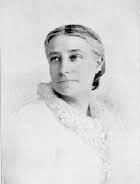Elizabeth Stuart Phelps Ward
Elizabeth Stuart Phelps Ward Poems
Was there ever message sweeter
Than that one from Malvern Hill,
From a grim old fellow-you remember?
...
'All the rivers run into the sea.'
Like the pulsing of a river,
The motion of a song,
Wind the olden words along
...
That heart were something cold, I think,
That on the light of stars relied
For daily fire; and cruel is
...
Within the window's scant recess,
Behind a pink geranium flower,
She sits and sews, and sews and sits,
From patient hour to patient hour.
...
Of Peter's daughter, it is said, men told,
While yet she breathed, a tale as sad as life,
As sweet as death; which, now she sleeps, has lent
...
'Would I could see!' I heard one say but now,
'The strongest woman and the tenderest man
That ever God had dared put in the world!'
...
Heart of iron, smile of ice,
Oh! the rock.
See him stand as dumb as death.
If you could,
...
The shadows watch about the house;
Silent as they, I come.
Oh, it is true that life is deaf,
And not that death is dumb.
...
I think if I should cross the room,
Far as fear;
Should stand beside you like a thought-
Touch you, Dear!
...
Happiness has found me out,
Found me out at last!
O, she 's dogged me round about;
All my hurrying life she 's chased me,
...
It chanceth once to every soul,
Within a narrow hour of doubt and dole,
...
I saw a miracle to-day!
Where the September sunshine lay
Languidly as a lost desire
Upon a sumach's fading fire,
...
Cold Care and I have run a race,
And I, fleet-foot, have won
A little space, a little hour,
To find the May alone.
...
If an angel that I know
Should now enter, sliding low
Down the shaft of quiet moonlight that rests upon the floor;
...
I
Dead, she drifted to his feet.
Tell us, Love, is Death so sweet?
...
I
As sentient as a wedding-bell,
The vibrant air throbs calling her
...
Take unto Thyself, O Father!
This folded day of thine,
This weary day of mine.
Its ragged corners cut me yet.
...
Elizabeth Stuart Phelps Ward Biography
Elizabeth Stuart Phelps Ward, born Mary Gray Phelps, (August 31, 1844-January 28, 1911) was an American author. She was born at Andover, Massachusetts. In most of her writings she used her mother's name "Elizabeth Stuart Phelps" as a pseudonym, both before and after her marriage in 1888 to Herbert Dickinson Ward, a journalist seventeen years younger. She also used the pseudonym Mary Adams. Her father Austin Phelps was pastor of the Pine Street Congregational Church until 1848, when he accepted a position as the Chair of Rhetoric at Andover Theological Seminary and moved the family to Boston. Ward wrote three Spiritualist novels, The Gates Ajar, Between the Gates and Beyond the Gates, and a novella about animal rights, Loveliness. While writing other popular stories, she was also a great advocate, by lecturing and otherwise, for social reform, temperance, and the emancipation of women. She was also involved in clothing reform for women, urging them to burn their corsets in 1874. Ward's mother, Elizabeth (Wooster) Stuart Phelps, (August 13, 1815—November 30, 1852) wrote the Kitty Brown books under the pen name H. Trusta. Elizabeth Stuart Phelps and her husband co-authored two Biblical romances in 1890 and 1891. Her autobiography, Chapters from a Life was published in 1896 after being serialized in McClure's. She also wrote a large number of essays for Harper's Phelps continued to write short stories and novels into the twentieth century. One work, Trixy (1904), dealt with another cause she supported, anti-vivisection (a topic on which she also addressed the Massachusetts State Legislature). Her last work, Comrades (1911), was published posthumously. Phelps died January 28, 1911, in Newton Center, Massachusetts.)
The Best Poem Of Elizabeth Stuart Phelps Ward
A Message
Was there ever message sweeter
Than that one from Malvern Hill,
From a grim old fellow-you remember?
Dying in the dark at Malvern Hill.
With his rough face turned a little,
On a heap of scarlet sand,
They found him, just within the thicket,
With a picture in his hand,-
With a stained and crumpled picture
Of a woman's aged face;
Yet there seemed to leap a wild entreaty,
Young and living-tender-from the face
When they flashed the lantern on it,
Gilding all the purple shade,
And stooped to raise him softly,-
'That 's my mother, sir,' he said.
'Tell her'-but he wandered, slipping
Into tangled words and cries,-
Something about Mac and Hooker,
Something dropping through the cries
About the kitten by the fire,
And mother's cranberry-pies; and there
The words fell, and an utter
Silence brooded in the air.
Just as he was drifting from them,
Out into the dark, alone,
(Poor old mother, waiting for your message,
Waiting with the kitten, all alone!)
Through the hush his voice broke,-'Tell her-
Thank you, Doctor-when you can,
Tell her that I kissed her picture,
And wished I 'd been a better man.'
Ah, I wonder if the red feet
Of departed battle-hours
May not leave for us their searching
Message from those distant hours.
Sisters, daughters, mothers, think you,
Would your heroes now or then,
Dying, kiss your pictured faces,
Wishing they 'd been better men?
